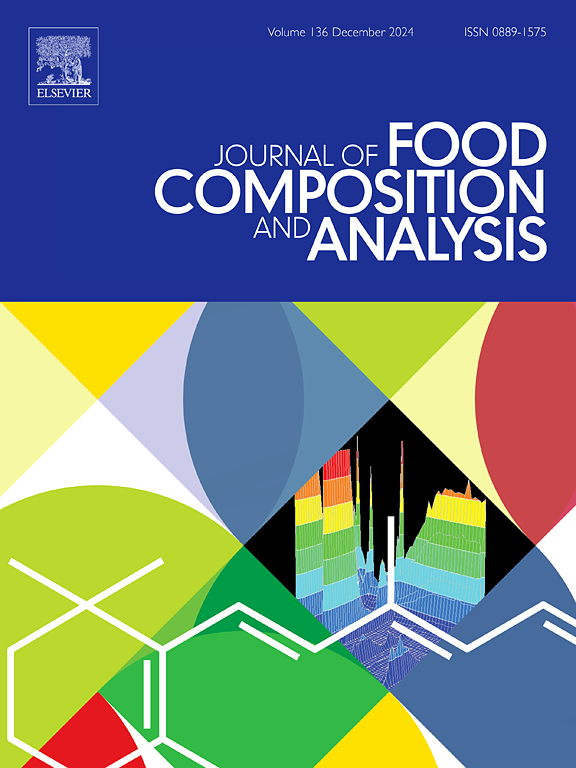测量和模拟西拉红葡萄酒的演变:陈酿测试、颜色和新的分子指数
IF 4
2区 农林科学
Q2 CHEMISTRY, APPLIED
引用次数: 0
摘要
在为期 24 个月的西拉(Syrah)红葡萄酒陈酿实验中,测量了不同微团聚瓶塞对葡萄酒成分和颜色的影响。根据目标酚类成分(氧化指数 Iox 和磺化指数 Isu)或色度(色调)提出了两种新的葡萄酒陈酿指数。结果表明,这些指数的演变斜率因葡萄酒和所研究的指数而异,初始成分在这些演变中起着主导作用。此外,软木塞的氧气转移率(OTR)会调节氧化指数和颜色的演变速度,但对磺化指数没有影响。为了根据加速老化试验(AAT)、伏安参数和装瓶前测量的酚类成分建立一些可以预测老化指数斜率的模型,我们使用了偏最小二乘法(PLS)回归。这些模型对每项测试都有不同的解释变量,并显示出良好的预测能力,相关系数(R²)为 0.79。本文章由计算机程序翻译,如有差异,请以英文原文为准。
Measuring and modelling Syrah red wines evolution: Ageing tests, color and new molecular indices
A Syrah red wine ageing experiment was set up during 24 months to measure the influence of different micro-agglomerated corks on wine composition and color. Two new wine ageing indices based on targeting phenolic composition (Iox, oxidation index and Isu, sulfonation index) or colorimetric one (Hue) are proposed. The results showed that the slopes of evolution of these indices varied according to the wine as well as the index studied, and that the initial composition played a predominant role in these evolutions. In addition, the oxygen transfer rate (OTR) of the cork modulates the rate of evolution of the oxidation index and color, but had no impact on the sulfonation index. Partial least squares (PLS) regressions were used in order to establish some models that can predict the ageing index slope based on accelerated ageing tests (AATs), voltammetric parameters and phenolic composition measured before bottling. The models involved different explaining variables for each test and showed good predictive capacities with correlation coefficients (R²) > 0.79.
求助全文
通过发布文献求助,成功后即可免费获取论文全文。
去求助
来源期刊

Journal of Food Composition and Analysis
工程技术-食品科技
CiteScore
6.20
自引率
11.60%
发文量
601
审稿时长
53 days
期刊介绍:
The Journal of Food Composition and Analysis publishes manuscripts on scientific aspects of data on the chemical composition of human foods, with particular emphasis on actual data on composition of foods; analytical methods; studies on the manipulation, storage, distribution and use of food composition data; and studies on the statistics, use and distribution of such data and data systems. The Journal''s basis is nutrient composition, with increasing emphasis on bioactive non-nutrient and anti-nutrient components. Papers must provide sufficient description of the food samples, analytical methods, quality control procedures and statistical treatments of the data to permit the end users of the food composition data to evaluate the appropriateness of such data in their projects.
The Journal does not publish papers on: microbiological compounds; sensory quality; aromatics/volatiles in food and wine; essential oils; organoleptic characteristics of food; physical properties; or clinical papers and pharmacology-related papers.
 求助内容:
求助内容: 应助结果提醒方式:
应助结果提醒方式:


